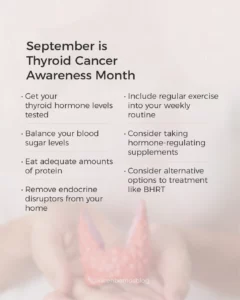

September is Thyroid Cancer Awareness Month
September is the time of the year when the awareness around thyroid cancer is in full swing. The focus is on the importance of early detection, ways to prevent it, overall hormonal health, and how to support those affected by the disease.
Thyroid Cancer
Thyroid cancer occurs when the cells in the thyroid gland start growing rapidly and uncontrollably. Although it’s not one of the most common cancers, improvements in the medical field discovered better early detection methods, making it more talked about in recent years.
Changes in the thyroid gland, as well as several different autoimmune conditions tied to it, are unfortunately, very common. They’re not the same as thyroid cancer, but they’re caused by certain hormonal imbalances that affect your entire body.
Hashimoto’s disease is an autoimmune condition that can cause an underactive thyroid, or hypothyroidism. This causes your thyroid to become damaged over time, leading to a need for hormonal therapy. On the other hand, hyperthyroidism, or an overactive thyroid, is usually caused by another autoimmune condition, Graves’ disease. In this case, your thyroid is working overtime, wreaking havoc and causing endocrine imbalance.
Thyroid cancer is not directly linked to these autoimmune conditions, although some data shows that the correlation might exist. The inflammation and damage caused by hypo and hyperthyroidism can have a negative effect on many areas of the human body, potentially increasing the risk of developing cancer.
Types of Thyroid Cancer
There are three main differentiations of thyroid cancers:
- Differentiated Thyroid Cancers – these include papillary (the most common thyroid cancer), follicular (second most common), and Hürthle cell (pretty rare).
- Medullary Thyroid Cancer – a rare type of thyroid cancer that starts in the C cells whose role is to produce calcitonin, a hormone that regulates the levels of calcium in your blood.
- Anaplastic Thyroid Cancer – very rare and very aggressive.
Risks for Developing Thyroid Cancer
Improvements in early detection and diagnostics made catching this grave disease easier and with more success in recovery. And even though there are biological and genetic components that are hard to have control over, there are certain actions and lifestyle habits that might play a role in increasing the risk of developing thyroid cancer.
- Exposure to radiation
- Being deficient in iodine
- Being overweight/obese
- Eating ultra-processed foods and aiding inflammation
Some of these lifestyle factors can definitely be put under your control, and choosing a healthier lifestyle will always be a positive change in your overall health and well-being.
Hormonal Health and the Thyroid
Our endocrine system is a complex network of messengers that dictate all of the functions in our bodies. If it’s balanced, everything runs smoothly, but if it’s not, it can create a multitude of issues in almost every area of our bodies. Hormonal health is crucial for keeping inflammation at bay, lowering the risk of developing cancer and other severe health conditions, and helping us stay vital for as long as our age allows us.
Since the thyroid is one of the most important parts of our endocrine system, knowing it’s healthy and working optimally is key to managing its function: producing and releasing hormones. There are two important hormones that are produced and secreted by the thyroid:
- T4 – also known as Thyroxine, which is the primary hormone produced by the thyroid
- T3 – also known as Triiodothyronine, which is the secondary hormone produced by the thyroid. However, T4 gets converted into T3 through a process called deiodination, making it have a greater affect on your metabolism.
Additionally, there is another essential hormone that closes the loop in thyroid function, but it’s produced and released by the pituitary gland and not your thyroid. It’s called the thyroid stimulating hormone, or TSH, and its role is to help stimulate your thyroid gland to produce and release its own hormones.
These three hormones need to be in perfect balance for everything to function optimally. Once there’s an imbalance in any of the parts of the hormonal cycle, there’s a potential for developing a variety of health issues and consequences. Your endocrine system is incredibly well-connected, which means that once there is an imbalance in one area, it almost immediately affects many others. That’s why it’s crucial to invest your time and energy into improving and maintaining good hormonal health.
Endocrine Disruptors
In today’s world, we’re surrounded with what are called endocrine disruptors, or chemicals that can have a negative effect on our hormones. Although we can try to minimize their impact in our own home, we’re still unable to fully distance ourselves from them in other environments. The effect they have on the human endocrine system can be detrimental, mimicking, blocking, or even altering hormones.
Some of the most common endocrine disruptors can be found in skincare, makeup, shampoos, and perfume, cleaning products, plastic packaging, and pesticides. They go by names of dioxins, bisphenol A, phthalates, phytoestrogens, atrazine, and others. Experts are encouraging customers to read the labels on the back of their products and replace all the ones with endocrine disruptors. Some great alternatives to endocrine disrupting products include:
- Green skincare and makeup like ILIA or OSEA
- Cleaner perfumes like OUAI
- Chemical-free detergent like Clean People
- Chemical-free diapers and wipes like Coterie
Bioidentical Hormone Replacement Therapy for Hormonal Imbalance
If you are dealing with hormonal imbalance, there are many ways to go about it. Most of the time, your doctor will recommend something known as hormone replacement therapy which is made to mimic your own hormones and help your body get back on track.
However, the traditional approach has been praised and villanized for many reasons, mainly for their origin. The conventional method uses artificial hormones made from pregnant mares, which doesn’t completely fit the human genetic profile. This can cause a variety of issues, with research even pointing to increasing the risk of certain cancers.
In recent years, the practice has begin shifting towards bioidentical hormones, which are sourced from plants and have an identical genetic makeup as humans. This makes them less likely to be rejected by the body and cause less health complications.
How to Improve Hormonal Health
Let’s shift the focus to ways and tips that can help improve and manage your hormonal health, helping you stay on top of your endocrine system and prevent any unpleasant consequences that come with hormonal imbalance.
Balance Your Blood Sugar Levels
Your blood sugar can have a great influence on your hormonal health, and many people aren’t even aware of the foods that cause their glucose to spike. Getting rid of ultra-processed foods and sugary drinks is a great first step, but it’s also important to increase your awareness of the list of ingredients in your food and make conscious and smart swaps for healthier alternatives.
- Buy healthier drinks like Olipop and Blue Stripes Cacao Water that, in addition to tasting just like your favorite soda or juice, have added antioxidants and fiber.
Eat Adequate Amounts of Protein
Protein is one of the three major macronutrients in our food, and it has an incredible impact on our overall hormonal health. Research shows that people in the US are not eating nearly as enough protein on a daily basis, especially as they’re getting older. This can cause a plethora of health issues, specifically in the musculoskeletal and endocrine systems. In addition to simply adding more protein to your diet, there are a few hacks you can use to ensure you’re keeping those numbers up.
- Snack on high-protein options like high-quality nuts and seeds and protein bars, swap your pasta for protein-rich chickpea pasta, and add Greek yogurt to your dressings instead of mayo or heavy cream.
Include Regular Exercise into Your Weekly Routine
Exercise is amazing for your overall health and longevity, and studies show it’s numerous benefits on the endocrine system. Whether it’s simply by lowering your cortisol and with it, stress, or regulating your feelings of hunger and satiety, or by directly impacting your sex hormones, regular exercise plays a huge role in hormonal health.
- Find something you enjoy and make it your mission to become consistent with it. Whether it’s taking long walks, going on runs, or getting in touch with their inner self through yoga and meditation.
Consider Taking Specific Hormone-Regulating Supplements
The food we eat today, is unfortunately, not as rich in vitamins and minerals as it once was. On top of that, the stress of today’s life and endocrine disruptors we are encountering on the daily is affecting all of us, often causing some sort of issues with our hormones. This is why supplementing with hormone-regulating compounds (and especially thyroid-regulating) might be a great idea. Here are a few supplements that might help:
- Selenium – helps maintain healthy thyroid function.
- Magnesium – helps balance the secretion of thyroid hormones, especially T3
- Vitamin D3 – deficiencies in Vitamin D have been linked to hypothyroidism and other dysfunctions of the thyroid gland
- Ashwagandha – a strong adaptogen that helps your body regulate stress
- Rhodiola – another potent adaptogen that helps balance out your stress hormones
Final Thoughts
With thyroid cancer awareness month coming around the corner, it’s important to take a moment to do an annual check, change those lifestyle habits that might be causing your thyroid to work overtime, and think about alternative methods of dealing with a hormonal imbalance if it does occur. If you’re interested in learning more on bioidentical hormones, here is a great resource you can benefit from.

hey there
I'm Karen!
I have found my cancer journey to be a positive and profound transformational experience. I’m inspired to share my healing journey here, and trust you’ll find hope, encouragement and purpose as you discover the healing power that lies within you.
Join
The Mailing List!
By signing up for my newsletter, you agree with our Privacy Policy and Terms & Conditions.



